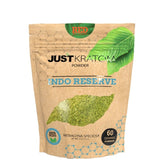It turns out cannabis isn't the only natural product gaining popularity for its wellness benefits. Meet kratom, a natural substance that can mimic the effects of opioids. You might have heard that kratom can help with anxiety, depression, and opioid withdrawal.
But there are also many risks and health concerns associated with kratom use that you might not be aware of. We're here to share what you need to know about kratom – and why you might want to think twice before using it.

What Exactly Is Kratom?
Kratom is an herbal substance known for its ability to produce both stimulant and opioid-like effects, depending on the dosage. You might come across kratom in stores as a supplement claiming to boost energy, improve mood, and relieve pain.
Kratom comes from the leaves of the Mitragyna speciosa tree, which grows in parts of Southeast Asia. It can be sold in various forms, including whole leaves that can be chewed, dry powder, or liquid.
Because kratom produces effects similar to opioids by interacting with the brain and body in similar ways, many people use it to alleviate withdrawal symptoms. In smaller doses, however, kratom acts more like a stimulant, leading to increased heart rate and heightened alertness.

The Effects of Kratom
There's still a lot we don't know about kratom and its effects on the mind and body – and that's where the problem lies. Most of the evidence we have is based on personal experiences. Many users claim that kratom can naturally help with mental health issues and pain. Some of the most commonly reported benefits of kratom include:
- Pain relief
- Improved mood
- Increased alertness or energy
- Arousal
- Better sleep and reduced insomnia
- Less frequent or intense withdrawal symptoms, especially for those dealing with opioid withdrawal
Learn more here: What Are The Effects of Kratom? Potential Benefits & Side Effects
However, just because kratom might have some pleasant effects doesn’t mean it’s completely safe to use.
In some Southeast Asian cultures, kratom has been used for generations. Interestingly, most cases of kratom-related deaths occur in the West, not in Southeast Asia. This suggests that the way kratom is sold and used in many countries, including the U.S., might be quite different from its traditional use as a medicine.

Kratom’s Side Effects & Its Risks
Kratom isn't regulated by the Food and Drug Administration (FDA), which means there's no official oversight ensuring kratom products are safe or accurately labeled.
There have been reports of kratom products contaminated with heavy metals and harmful bacteria, sold to unsuspecting consumers. Since kratom use isn't well understood, it can be challenging to figure out the right dosage for your body.
Taking too much kratom increases the risk of side effects and health issues. Some common side effects to watch out for include:
- Dry mouth
- Nausea and vomiting
- Drowsiness
- Constipation
- Sweating
- Increased urination
- Loss of appetite and weight loss
In severe cases, kratom can cause liver damage, seizures, and hallucinations. Extreme overdoses have even led to death. It's important to be cautious and informed when considering kratom use. Furthermore, combining kratom with alcohol is not recommended.
As of now, kratom is legal in most places, although some states and countries are working on creating informed legislation around its use. Since kratom isn't illegal at the federal level, it's up to individual states to decide how to handle it.
As of 2023, a few states have passed regulations that limit or ban kratom use, including:
- Alabama
- Arkansas
- Indiana
- Rhode Island
- Vermont
- Wisconsin
Kratom is also illegal in many countries outside the U.S. It's likely that more states may change their stance on kratom in the coming months and years.

What Science Has to Say About Kratom’s Safety
If kratom is unregulated and we don't fully understand how it works, just how safe is it? Based on what we know now, the answer is clear: kratom is something we still need to learn more about.
We can't say for sure whether it's safe because researchers haven't yet determined if certain doses cause health problems or if kratom itself is the issue. Similarly, there are many unanswered questions about whether kratom is addictive or if it poses health risks for those taking medications.
Being an informed consumer is your best defense against potentially unsafe products. Let’s explore what current research can tell us about kratom’s safety so you can make smart decisions about its use.
Is Kratom Addictive?
While kratom is often used to help with opioid addiction and withdrawal, it does have addictive qualities. Researchers agree that kratom addiction symptoms are generally less severe than those of opioids, but that's not saying much, considering opioids are among the deadliest substances.
Research shows a clear link between kratom use and dependency. In other words, the more you use kratom, the more likely you are to develop cravings and, eventually, an addiction. With addiction comes withdrawal symptoms, which can include:
- Mood swings
- Nervousness or restlessness
- Sleep problems
- Sadness
- Muscle spasms
- Diarrhea
- Fever
- Runny eyes and nose
- Lack of appetite
Why can kratom be addictive? Like the opioids it aims to replace, kratom interacts with your brain’s natural reward system. Specifically, two compounds in kratom—mitragynine and 7-hydroxymitragynine—act on opioid receptors. While mitragynine isn’t as potent as opioids, 7-hydroxymitragynine is incredibly strong; it may be up to 13 times more potent than morphine.
Researchers believe these compounds activate certain opioid receptors. Some even note that they can have mixed effects, acting as either activators (agonists) or blockers (antagonists). This difference helps explain the opiate- and stimulant-like effects of kratom but also makes understanding its impact more challenging.

Potential Interactions and Risks of Kratom
Kratom has the potential to interact with other drugs, including prescription medications. Some animal studies have shown that kratom can affect liver enzymes responsible for processing drugs, which influences how your body breaks them down. Changing the levels of drugs in your system can have serious health implications.
Additionally, kratom can increase cholesterol levels and impair memory and learning. A kratom addiction can also cause its own set of problems. Withdrawal symptoms can be unpleasant and even painful, potentially leading to long-term health issues like depression or anxiety.
Lack of Research
Experts generally agree on one thing about kratom: while it shows promise in treating pain or opioid addictions, a lot more research is necessary before making definitive claims about its safety and effectiveness.
There's still much we don’t fully comprehend about how kratom can affect individuals differently. Existing studies are mostly pre-clinical and primarily examine how kratom impacts the body, rather than its safe and effective use in symptom treatment.
It's clear that more research is crucial to understanding kratom better and ensuring its safe application.

What Are Some Alternatives to Kratom?
If you're seeking relief from symptoms like chronic pain, anxiety, insomnia, or the stress of daily life, we have good news. CBD, THC (delta-8 or delta-9), and other cannabinoids are safe and effective alternatives. It's always wise to consult with your doctor before using CBD to ensure it's safe for you.
Here at The Gold Dragon Kratom, we're dedicated to partnering with trusted manufacturers to provide products we believe in. You can rely on us to help you choose the natural remedies that best suit your needs.
Feel free to reach out for a complimentary consultation to discover more about your options.




